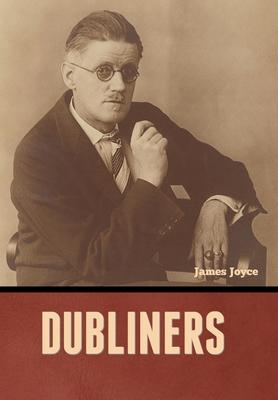Dubliners is a collection of fifteen short stories by James Joyce, first published in 1914. It presents a naturalistic depiction of Irish middle class life in and around Dublin in the early years of the 20th century.
The stories were written when Irish nationalism was at its peak, and a search for a national identity and purpose was raging; at a crossroads of history and culture, Ireland was jolted by various converging ideas and influences. They centre on Joyce's idea of an epiphany (a moment where a character experiences a life-changing self-understanding or illumination) and the theme of paralysis (Joyce felt Irish nationalism stagnated cultural progression, placing Dublin at the heart of a regressive movement). The first three stories in the collection are narrated by child protagonists, while the subsequent stories are written in the third person and deal with the lives and concerns of progressively older people, in line with Joyce's division of the collection into childhood, adolescence, maturity, and public life. Many of the characters in Dubliners later appeared in minor roles in Joyce's novel Ulysses.
The stories
"The Sisters" - After the priest Father Flynn dies, a young boy who was close to him hears some less-than-flattering stories about the father.
"An Encounter" - Two schoolboys playing truant encounter a perverted, middle-aged man.
"Araby" - A boy falls in love with the sister of his friend, but fails in his quest to buy her a worthy gift from the Araby Bazaar.
"Eveline" - A young woman weighs her decision to flee Ireland with a sailor.
"After the Race" - College student Jimmy Doyle tries to fit in with his wealthy friends.
"Two Gallants" - Lenehan wanders around Dublin to kill time while waiting to hear if his friend, Corley, was able to con a maid out of some money.
"The Boarding House" - Mrs Mooney successfully manoeuvres her daughter Polly into an upwardly mobile marriage with her lodger Mr Doran.
"A Little Cloud" - Little Chandler's dinner with his old friend Ignatius Gallaher, who left home to become a journalist in London, casts fresh light on his own failed literary dreams.
"Counterparts" - Farrington, a lumbering alcoholic scrivener, takes out his frustration in pubs and on his son Tom.
"Clay" - Maria, a spinster who works in the kitchen at a large laundry, celebrates Halloween with a man she cared for as a child and his family.
"A Painful Case" - Mr Duffy rebuffs the advances of his friend Mrs Sinico, and, four years later, discovers he condemned her to loneliness and death.
"Ivy Day in the Committee Room" - Several paid canvassers for a minor politician discuss the memory of Charles Stewart Parnell.
"A Mother" - To win a place of pride for her daughter Kathleen in the Irish Revival, Mrs. Kearney arranges for the girl to be accompanist at a series of poorly planned concerts, but her efforts backfire.
"Grace" - Mr Kernan passes out and falls down the stairs at a bar, so his friends attempt to convince him to come to a Catholic retreat to help him reform.
"The Dead" - After a holiday party thrown by his aunts and cousin, Gabriel Conroy's wife, Gretta, tells him about a boyfriend from her youth, and he has an epiphany about life and death and human connection. (At 15-16,000 words, this story has been classified as a novella.) (wikipedia.org)
